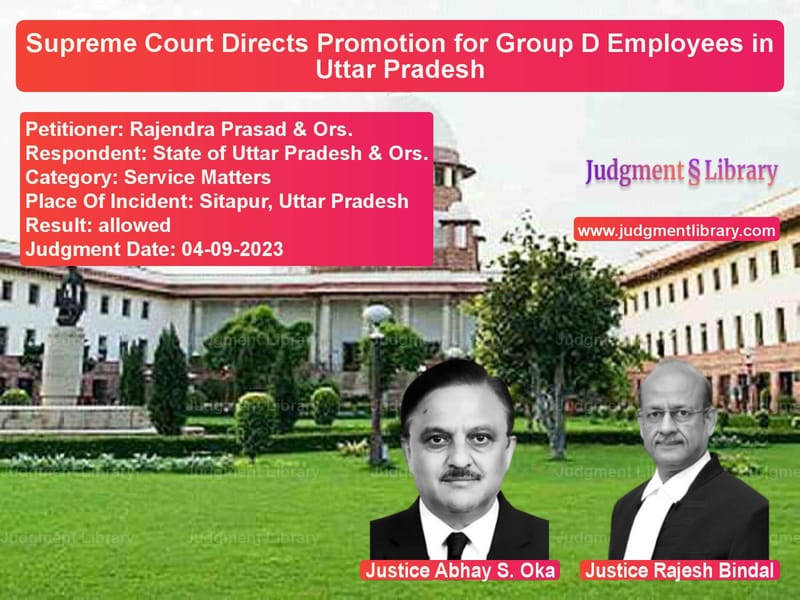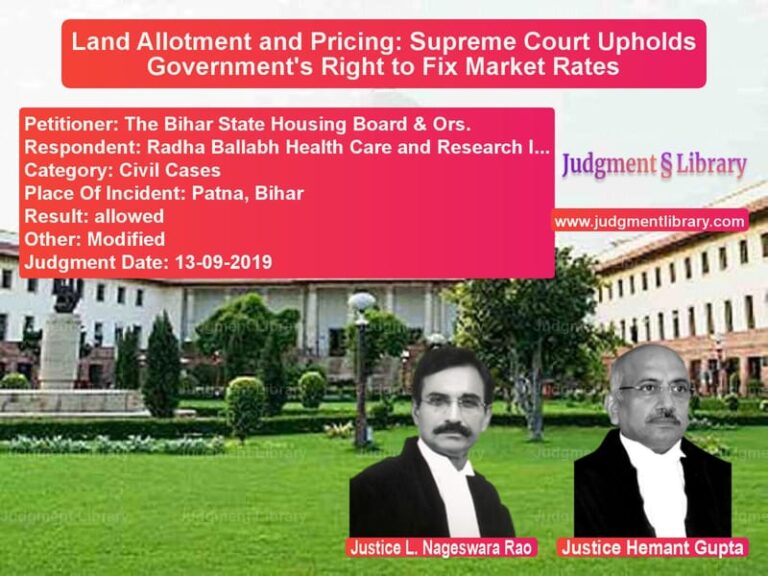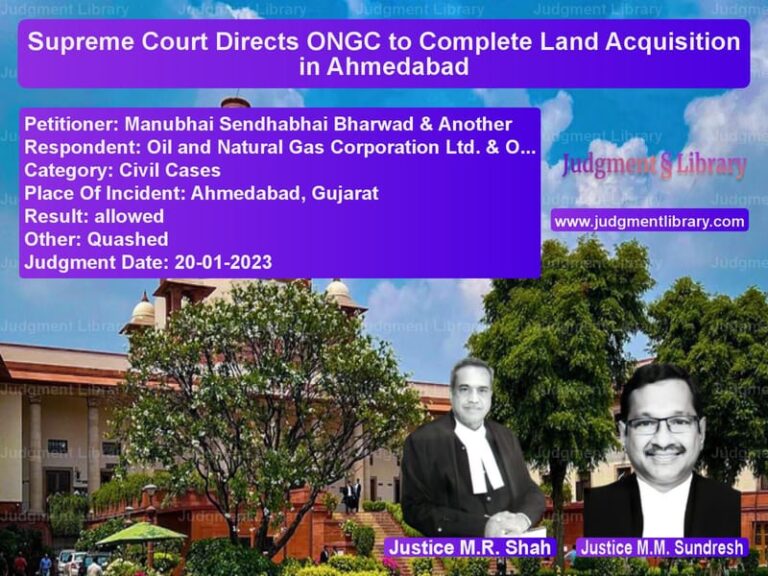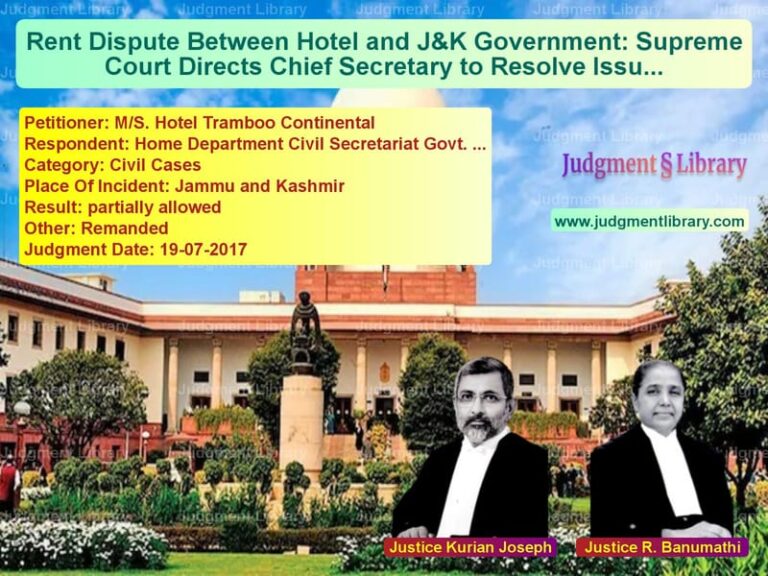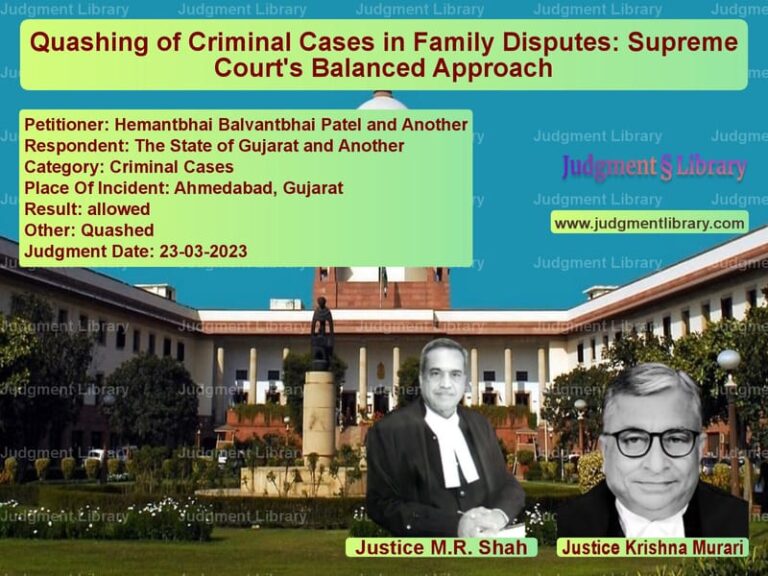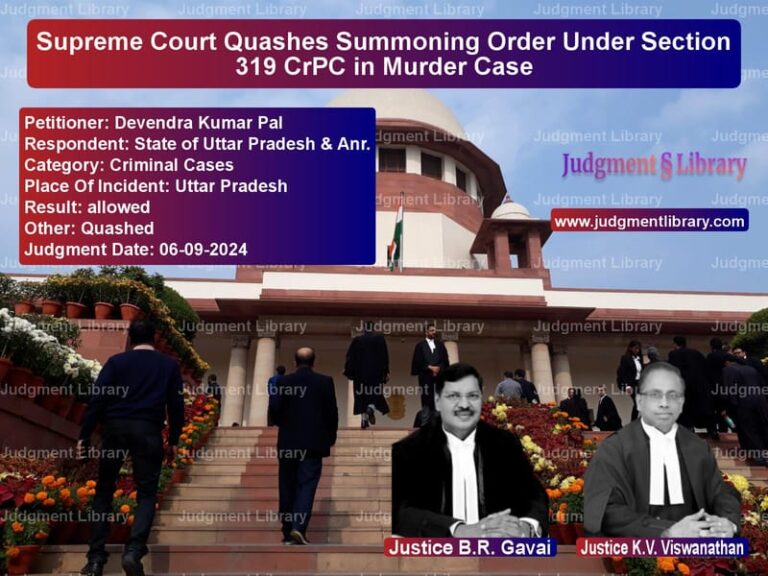Supreme Court Directs Promotion for Group D Employees in Uttar Pradesh
The Supreme Court of India recently issued a significant ruling in Rajendra Prasad & Ors. v. State of Uttar Pradesh & Ors., addressing the issue of long-pending promotions of Group D employees to Group C posts in Uttar Pradesh. The Court exercised its extraordinary jurisdiction under Article 142 of the Constitution to direct the promotion of eligible candidates who had been waiting for years despite existing vacancies.
Background of the Case
The case involved the recruitment process for ministerial Group C posts in subordinate offices, governed by the Uttar Pradesh Subordinate Offices Ministerial Group “C” Posts of the Lowest Grade (Recruitment by Promotion) Rules, 2001. As per Rule 5, 20% of the vacancies in these posts were to be filled by promotion from Group D employees:
- 15% quota for Group D employees who passed the High School examination with five years of service.
- 5% quota for those who passed the Intermediate examination.
In 2010, a Promotion Committee prepared a seniority list of Group D employees in the Collectorate, Sitapur, for promotion to Group C posts. On December 4, 2014, the District Magistrate of Sitapur promoted some candidates, while others, despite being senior, were not selected. The aggrieved employees challenged this decision.
The appellants initially approached the Allahabad High Court, which directed them to file a claim before the Uttar Pradesh State Public Services Tribunal. The Tribunal found irregularities in the process but ultimately rejected the appellants’ claims upon remand from the High Court. The appellants then filed a fresh writ petition, which the High Court dismissed on the ground that Rule 5 only defines the source of recruitment and that promotions were based on merit.
Unhappy with this decision, the appellants moved the Supreme Court.
Key Legal Issues Before the Supreme Court
- Whether Rule 5 of the 2001 Rules was followed correctly in granting promotions.
- Whether the 15% quota for High School graduates was effectively eliminated due to procedural errors.
- Whether vacancies in Group C posts were correctly allocated to Group D employees.
- Whether the long delay in conducting promotion exercises violated the rights of eligible employees.
Arguments by the Petitioners (Appellants)
The appellants contended:
- The selection process was flawed as it ignored senior employees who met the educational qualifications.
- The 15% quota for High School graduates was not properly implemented, disadvantaging deserving candidates.
- The authorities failed to conduct promotion processes after 2015, despite existing vacancies, depriving eligible employees of their rightful promotions.
- The High Court erred in dismissing their claims without properly considering their grievances.
Arguments by the Respondents (State of Uttar Pradesh)
The State government argued:
- All promotions were granted based on merit, in accordance with Rule 8 of the 2001 Rules.
- The selection process included proper assessment, and only those with the highest scores were promoted.
- The High Court correctly upheld the promotions since they were based on comparative merit and not automatic seniority.
- The appellants failed to establish any specific violation of the Rules.
Supreme Court’s Analysis
1. Procedural Errors in the Promotion Process
The Court found that the selection process effectively nullified the 15% quota for High School-qualified candidates. It observed:
“By preparing a combined list, the 15% quota earmarked for those who had passed the High School Examination was effectively obliterated.”
The Court emphasized that the government had an obligation to ensure fair implementation of Rule 5.
2. Delay in Promotions and Vacancies
The Court noted that after 2015, no Selection Committee was constituted to fill Group C vacancies from Group D employees. It found that 19 vacancies existed but were not filled through the prescribed quota system. The judgment stated:
“For the last eight years, though there are vacancies, Group C posts have not been filled from the source of recruitment as provided in Rule 5 of the said Rules.”
3. Exercise of Jurisdiction Under Article 142
Recognizing the long delay in promotions, the Court invoked its powers under Article 142 to grant relief. It ruled:
“This is a fit case to exercise our jurisdiction under Article 142 of the Constitution of India by directing the respondents to grant promotion to four candidates immediately below those promoted in 2014.”
Supreme Court’s Judgment
The Supreme Court set aside the High Court’s dismissal and issued the following directives:
- Four candidates—three with High School qualifications and one with Intermediate qualifications—should be promoted immediately.
- The promoted candidates will be considered appointed from the date of their promotion order.
- They will receive seniority from the actual date of appointment.
- No monetary relief will be provided for the past period, but they will receive salary and other perquisites from the date of appointment.
- The Uttar Pradesh government must implement these directives within two months.
The Court concluded:
“We make it clear that as this direction is issued under Article 142 of the Constitution of India, this decision shall not be treated as a precedent.”
Implications of the Judgment
This ruling has significant implications:
- Enforcement of Quota System: The judgment ensures that quotas under Rule 5 of the 2001 Rules are correctly implemented.
- Accountability in Delayed Promotions: The ruling highlights that prolonged inaction in filling vacancies deprives eligible employees of career advancement.
- Judicial Intervention in Service Matters: The Supreme Court’s exercise of power under Article 142 provides relief in cases of administrative failure.
Conclusion
The Supreme Court’s ruling in Rajendra Prasad & Ors. v. State of Uttar Pradesh & Ors. serves as a landmark decision in service law, ensuring fair implementation of promotion policies. By stepping in to correct long-standing administrative failures, the Court has reinforced the principles of fairness, merit, and equal opportunity in public service employment.
Petitioner Name: Rajendra Prasad & Ors..Respondent Name: State of Uttar Pradesh & Ors..Judgment By: Justice Abhay S. Oka, Justice Rajesh Bindal.Place Of Incident: Sitapur, Uttar Pradesh.Judgment Date: 04-09-2023.
Don’t miss out on the full details! Download the complete judgment in PDF format below and gain valuable insights instantly!
Download Judgment: rajendra-prasad-&-or-vs-state-of-uttar-prade-supreme-court-of-india-judgment-dated-04-09-2023.pdf
Directly Download Judgment: Directly download this Judgment
See all petitions in Promotion Cases
See all petitions in Public Sector Employees
See all petitions in Recruitment Policies
See all petitions in Judgment by Abhay S. Oka
See all petitions in Judgment by Rajesh Bindal
See all petitions in allowed
See all petitions in supreme court of India judgments September 2023
See all petitions in 2023 judgments
See all posts in Service Matters Category
See all allowed petitions in Service Matters Category
See all Dismissed petitions in Service Matters Category
See all partially allowed petitions in Service Matters Category

